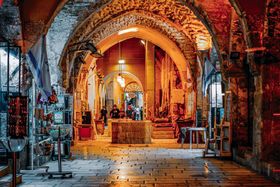Who Were the Amorites in the Bible?
The Bible describes the Amorites as a strong and sinful nation. But who were they, and what was their role in the Bible? How and why were they destroyed?
Published November 30, 2021.
The Amorites were the indigenous people of northern and central Syria during the Early Bronze Age (3200-2000BC). They spoke a Semitic language similar to Hebrew.
What Were the Amorites Known For?
In the Bible, the Amorites are described as a powerful nation well known for their stature. In Amos 2:9, we read how the Amorite people were as tall as cedar trees. They were also known for their evil ways, idol worship, and as enemies of the Israelites.
The Amorites descended from Emer, the fourth son of Canaan, son of Ham, son of Noah (Genesis 10:16). They were from Syria, and ruled the ancient cities of Aleppo, Carchemish, and Ebla among others. At the time of Israel's exodus from Egypt, the Amorites ruled much of present-day Palestine and Jordan.
Why Did God Destroy the Amorites?
The main sin of the biblical Amorites was idol worship. They provoked God to judgment with their idol worship. God was patient and gave them plenty of time to change their ways, but they did not. When God felt the time was right, he sent down his judgment upon them.
The Amorites worshipped a pantheon of deities. Two of the most prominent Amorite idols were Amurru (Belu-Sadi or Lord of the Mountains) and his wife Belit-Seri (Lady of the Desert). Amurru was the chief deity among the many false gods of the Amorites.
The Importance of the Biblical Amorites
In the Old Testament, the Amorites are frequently listed among the enemies of Israel and are given as an example of pure evil. God gave the Amorites time to change their ways, but it was their choice to refuse. The lesson gained is that God is merciful and patient with sinners, so long as they have the foresight and humility to change their ways, but even a powerful nation of giants could not withstand the judgment of God.
Related Articles

What Jesus Did After His Resurrection
Alice Bassett
February 28, 2022

Jerusalem Unveiled: A Christian Pilgrim's Guide to Summer 2023
Daniel Goodman
September 28, 2023

Pilgrimage Journey: Top Places to Visit in Israel as a Christian: Part 2.
Daniel Goodman
July 4, 2024

10 Unique Gifts to Bring Back From Israel
Brandy Morrison
December 4, 2024

Why Holy Land Products Make Meaningful Gifts for Christians
Christel Owoo
February 9, 2025
Related Posts
Marie-Claire De Villiers
The Cenacle: Visiting the Room of the Last Supper in Jerusalem
Marie-Claire De Villiers


